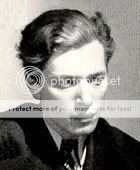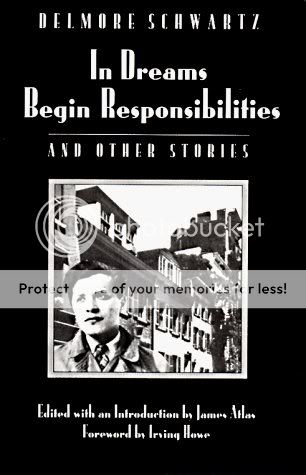Poetry Wednesday 10/22/08: The First Night of Fall and Falling Rain
The First Night Of Fall And Falling Rain
by Delmore Schwartz
The common rain had come again
Slanting and colorless, pale and anonymous,
Fainting falling in the first evening
Of the first perception of the actual fall,
The long and late light had slowly gathered up
A sooty wood of clouded sky, dim and distant more and
more
Until, at dusk, the very sense of selfhood waned,
A weakening nothing halted, diminished or denied or set
aside,
Neither tea, nor, after an hour, whiskey,
Ice and then a pleasant glow, a burning,
And the first leaping wood fire
Since a cold night in May, too long ago to be more than
Merely a cold and vivid memory.
Staring, empty, and without thought
Beyond the rising mists of the emotion of causeless
sadness,
How suddenly all consciousness leaped in spontaneous
gladness,
Knowing without thinking how the falling rain (outside, all
over)
In slow sustained consistent vibration all over outside
Tapping window, streaking roof,
running down runnel and drain
Waking a sense, once more, of all that lived outside of us,
Beyond emotion, for beyond the swollen
distorted shadows and lights
Of the toy town and the vanity fair
of waking consciousness.

Delmore Schwartz (1913 – 1966) was born and raised in Brooklyn, New York. His parents split up when he was nine, and their divorce and quarrels had a profound effect on him.
Schwartz spent time at Columbia University and the University of Wisconsin, before finally graduating from New York University in 1935. Soon after graduation, he made his parents’ disastrous marriage the subject of his most famous short story, “In Dreams Begin Responsibilities” which was published in 1937 in the first issue of Partisan Review . This and other short stories and poems were collected and released in his first book, under the same name (1938). (The story was later republished in the collection In Dreams Begin Responsibilities and Other Stories (1978).) This first work was well received, and made him a well-known figure in New York intellectual circles. His work received praise from some of the most well-respected people in literature, and he was considered one of the most gifted writers of his generation.
In 1937, he also married his first wife, Gertrude Buckman, whom he divorced after six years.
For the next couple of decades, he continued to publish numerous stories, poems, and plays, and edited the Partisan Review from 1943 to 1955 as well as The New Republic, and in 1948, he married the much younger, Elizabeth Pollett. Unfortunately, this relationship also ended in divorce.
In 1959, he became the youngest recipient of the Bollingen Prize, awarded for a collection of poetry he released that year, Summer Knowledge: New and Selected Poems. His poetry differed in many respects from his stories in that it wasn’t especially autobiographical and was much more philosophical. His verse would also become increasingly abstract in his later years.
Schwartz taught creative writing at 6 different universities and in 1962 taught one of his most famous students, future singer-songwriter Lou Reed, founder of the Velvet Underground, a rock and roll band, was a student of Schwartz’s at Syracuse University. Reed refers to Schwartz as a “spiritual godfather.”Reed dedicated several songs to his mentor (most notably “European Son”).
In addition to being known as a gifted writer, Schwartz was also known as a great conversationalist and spent a lot of time entertaining friends at the White Horse Tavern in New York City.
Much of Schwartz’s work is notable for its philosophical and deeply meditative nature, and the literary critic, R.W. Flint, wrote that Schwartz’s stories were, “the definitive portrait of the Jewish middle class in New York during the Depression.”
Unfortunately, he was unable to repeat or build on his early successes later in life as a result of alcoholism and mental illness, and his last years were spent in isolation in the Hotel Marlon in New York City (this downward spiral following his initial success formed the basis for Saul Bellow’s novel Humboldt’s Gift (1975). In fact, he was so cut off from the rest of the world that when he died on July 11, 1966 at age 53, two days passed before his body was identified.
In the years before his death, a disheveled Delmore could frequently be found on a bench in Washington Square Park in New York City, a worn-out body in a worn-out suit, a pathetic figure with grimy hands and greenish pallor. But the final entries in his published journals from 1959 are filled with literary projects, translations from Paul Valéry, lengthy quotes from Hamlet, and transcendent fragments of new poems. He wrote in the margin of a letter untitled:
The years pass and the years pass,
and still I see only as in a glass,
darkly and vaguely,
waiting in grinding misery,
for the fountain of poetry,
to flow and overflow once again.
Schwartz is considered a cerebral, “city” poet known and respected by fellow poets but not widely read outside this group. Scott Spencer wrote a novel about young love and called it Endless Love after the following poem by Schwartz:
I Am a Book I Neither Wrote nor Read
I am a book I neither wrote nor read,
A comic, tragic play in which new masquerades
Astonishing as guns crackle like raids
Newly each time, whatever one is prepared
To come upon, suddenly dismayed and afraid,
As in the dreams which make the fear of sleep
The terror of love, the depth one cannot leap.
How the false truths of the years of youth have passed!
Have passed at full speed like trains which never stopped
There where I stood and waited, hardly aware,
How little I knew, or which of them was the one
To mount and ride to hope or where true hope arrives.
I no more wrote than read that book which is
The self I am, half hidden as it is
From one and all who see within a kiss
The lounging formless blackness of an abyss.
How could I think the brief years were enough
To prove the reality of endless love?
In Dreams Begin Responsibilities


Link back to the Poetry Wednesday tour on Laurita’s page
|
sanssouciblogs wrote on Oct 20, ’08
This is writing, with such depth, emotion, power. He’s always been a favorite of mine.
The years pass and the years pass, and still I see only as in a glass, darkly and vaguely, waiting in grinding misery, for the fountain of poetry, to flow and overflow once again. Looks like he was in the club of the suffering creative. Just brilliant. Wonderful post, dear sis. Love the rain… |
|
billatplay wrote on Oct 20, ’08
The echo of a torn person not knowing where the tear is? Sad. Comes from not facing life as a series of challenging events over which we have no control or choice.
|
|
lauritasita wrote on Oct 20, ’08
Why is it that the most gifted suffer the most ?
|
|
slohomeles wrote on Oct 20, ’08
lauritasita said
Often times suffering is the cost with which creativity is born… at other times it’s the creative which causes the suffering as with Van Gogh.
I’ve never read any of this author’s works, but after reading this post I intended to. Thanks. |
|
dianahopeless wrote on Oct 20, ’08
Thank you for introducing me to a new writer. He was a gifted one to be sure. I appreciate the background and bio on him too. And, I could sit and listen to the rain here all night long…..~sigh~
|
|
bostonsdandd wrote on Oct 21, ’08
I LOVE the last one. I really understand where the author is coming from. And I agree with Bill. I don’t think the man knew what was making him feel this way, he just knew he DID feel it. I think that’s half the battle is accepting the truth that there IS a problem. GREAT post!
http://bostonsdandd.multiply.com/journal/item/214/Poetry_WednesdayComes_The_DawnBy_Veronica_A._Shoffstall |
|
sweetpotatoqueen wrote on Oct 21, ’08
The writers mingling of nature and of being awakened from his consciousness by the rain is a wonderful message of the vanity of man compared to the simplicity of nature. Humans can be such a moody species! Really interesting themes here. I’l be back to read again and listen to the rain (which is wonderful!) Great choice,as always! HUGS!
|
|
lauritasita said
How romantic and deeply sensitive poems!!! What a cynically clear view of reality!…Being in a romantic mood – autumn is to blame for this! – I felt my heart melting…
Thank you, dear Laurita! 🙂 |
|
lauritasita wrote on Oct 22, ’08
Delmore Schwartz is a very profound poet. Thanks for visiting.
|
|
eccentricmare wrote on Oct 22, ’08
The depth and breath of the man still ring odes to the city, long may it continue, thank you for the reminder!
|
|
lauritasita wrote on Oct 22, ’08
His short stories are wonderful, too, and you can get them at your local bookstore or library.
|
|
Sounds like an interesting fellow, I enjoyed reading.
http://sylvie1.multiply.com/journal/item/656/_POETRY_WEDNESDAY_ |
|
lauritasita wrote on Oct 22, ’08
Thanks for visiting. I’m glad you enjoyed the poems.
|
|
skeezicks1957 wrote on Oct 27, ’08
Gifted to the point of genius and often genius is close to madness. What an interesting life and what wonderful work he left for us.
|
Viewing History
Viewed 34 times by 18 people, latest on Oct 29, ’08
Relaxing Rain Ambience (Nature sounds only version) – Nature Sound Series


 Why is it that the most gifted suffer the most ?
Why is it that the most gifted suffer the most ? 
 Add a Comment
Add a Comment
Comments
Poetry Wednesday 10/22/08: The First Night of Fall and Falling Rain — No Comments
HTML tags allowed in your comment: <a href="" title=""> <abbr title=""> <acronym title=""> <b> <blockquote cite=""> <cite> <code> <del datetime=""> <em> <i> <q cite=""> <s> <strike> <strong>